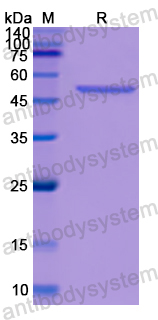Catalog No.
YHE44401
Expression system
E. coli
Species
Homo sapiens (Human)
Protein length
Met1-Lys418
Predicted molecular weight
49.68 kDa
Nature
Recombinant
Endotoxin level
Please contact with the lab for this information.
Purity
>90% as determined by SDS-PAGE.
Accession
P43686
Applications
ELISA, Immunogen, SDS-PAGE, WB, Bioactivity testing in progress
Form
Lyophilized
Storage buffer
Lyophilized from a solution in PBS pH 7.4, 0.02% NLS, 1mM EDTA, 4% Trehalose, 1% Mannitol.
Reconstitution
Reconstitute in sterile water for a stock solution. A copy of datasheet will be provided with the products, please refer to it for details.
Shipping
In general, proteins are provided as lyophilized powder/frozen liquid. They are shipped out with dry ice/blue ice unless customers require otherwise.
Stability and Storage
Use a manual defrost freezer and avoid repeated freeze thaw cycles. Store at 2 to 8°C for frequent use. Store at -20 to -80°C for twelve months from the date of receipt.
Alternative Names
PSMC4, MB67-interacting protein, TBP7, TBP-7, Tat-binding protein 7, MIP224, 26S proteasome regulatory subunit 6B, 26S proteasome AAA-ATPase subunit RPT3, Proteasome 26S subunit ATPase 4
The role of PSMC4 in non-small cell lung cancer: implications for prognosis, diagnosis, and immune microenvironment modulation., PMID:40386560
Discovering new hub genes of dilated cardiomyopathy., PMID:40074718
The mechanism underlying the oncogenic potential of AAA+ ATPase PSMC4 in cancer is revealed by mutations and copy number amplifications., PMID:39985882
NDRG1 upregulation by ubiquitin proteasome system dysfunction aggravates neurodegeneration., PMID:39444004
Bioinformatics to analyze the differentially expressed genes in different degrees of Alzheimer's disease and their roles in progress of the disease., PMID:38315405
Differential expression of PSMC4, SKP1, and HSPA8 in Parkinson's disease: insights from a Mexican mestizo population., PMID:38115821
PSMC4 promotes prostate carcinoma progression by regulating the CBX3-EGFR-PI3K-AKT-mTOR pathway., PMID:37436074
Novel insights into the immune cell landscape and gene signatures in autism spectrum disorder by bioinformatics and clinical analysis., PMID:36761165
In-depth systems biological evaluation of bovine alveolar macrophages suggests novel insights into molecular mechanisms underlying Mycobacterium bovis infection., PMID:36532492
Salmonella Typhimurium induces genome-wide expression and phosphorylation changes that modulate immune response, intracellular survival and vesicle transport in infected neutrophils., PMID:36450302
Proteomics analysis of cancer tissues identifies IGF2R as a potential therapeutic target in laryngeal carcinoma., PMID:36299463
Identification of Suitable Reference Genes for Lowlanders Exposed to High Altitude and Ladakhi Highlanders., PMID:36219748
A-to-I nonsynonymous RNA editing was significantly enriched in the ubiquitination site and correlated with clinical features and immune response., PMID:36064557
Identifying Potential Mitochondrial Proteome Signatures Associated with the Pathogenesis of Pulmonary Arterial Hypertension in the Rat Model., PMID:35237384
Identification of Hub Genes Associated With Tuberculous Pleurisy by Integrated Bioinformatics Analysis., PMID:34925441
Novel Insight Into the Association Between Obesity and Hepatocellular Carcinoma Occurrence and Recurrence: High-Throughput Microarray Data Set Analysis of Differentially Expressed Genes., PMID:34860577
Identification of a quality-control factor that monitors failures during proteasome assembly., PMID:34446601
Prognoses and genomic analyses of proteasome 26S subunit, ATPase (PSMC) family genes in clinical breast cancer., PMID:34329194
Upregulated monocyte expression of PLIN2 is associated with early arterial injury in children with overweight/obesity., PMID:34044206
A novel risk score system of immune genes associated with prognosis in endometrial cancer., PMID:32549787
Inhibition of dual-specificity tyrosine phosphorylation-regulated kinase 2 perturbs 26S proteasome-addicted neoplastic progression., PMID:31754034
Classical swine fever virus non-structural protein 4B binds tank-binding kinase 1., PMID:30541955
Structural mechanism for nucleotide-driven remodeling of the AAA-ATPase unfoldase in the activated human 26S proteasome., PMID:29636472
Novel proteins that regulate cell extension formation in fibroblasts., PMID:29476834
Differential Alterations in Metabolism and Proteolysis-Related Proteins in Human Parkinson's Disease Substantia Nigra., PMID:29218503
Conformational Landscape of the p28-Bound Human Proteasome Regulatory Particle., PMID:28689658
TRAP1 controls cell cycle G2-M transition through the regulation of CDK1 and MAD2 expression/ubiquitination., PMID:28678347
Site-specific proteasome phosphorylation controls cell proliferation and tumorigenesis., PMID:26655835
Proteasome subunit and opioid receptor gene expression down-regulation induced by paraquat and maneb in human neuroblastoma SH-SY5Y cells., PMID:26498265
Latent Pathways Identification by Microarray Expression Profiles in Thyroid-Associated Ophthalmopathy Patients., PMID:25982257
'Conceptualizing' the Endometrium: Identification of Conceptus-Derived Proteins During Early Pregnancy in Cattle., PMID:25947061
Proteasome dysfunction induces muscle growth defects and protein aggregation., PMID:25380823
Proteasome activation is a mechanism for pyrazolone small molecules displaying therapeutic potential in amyotrophic lateral sclerosis., PMID:25001311
TRAP1 role in endoplasmic reticulum stress protection favors resistance to anthracyclins in breast carcinoma cells., PMID:24297638
Identification of suitable reference genes for real-time PCR analysis of statin-treated human umbilical vein endothelial cells., PMID:23251572
Mitochondrial proteomics of nasopharyngeal carcinoma metastasis., PMID:23217164
Psychotropics regulate Skp1a, Aldh1a1, and Hspa8 transcription--potential to delay Parkinson's disease., PMID:23046827
A molecular signature in blood identifies early Parkinson's disease., PMID:22651796
Identification of stable endogenous control genes for transcriptional profiling of photon, proton and carbon-ion irradiated cells., PMID:22594372
TRAP1 and the proteasome regulatory particle TBP7/Rpt3 interact in the endoplasmic reticulum and control cellular ubiquitination of specific mitochondrial proteins., PMID:21979464
Dual regulation of the transcriptional activity of Nrf1 by β-TrCP- and Hrd1-dependent degradation mechanisms., PMID:21911472
Identification of genes that elicit disuse muscle atrophy via the transcription factors p50 and Bcl-3., PMID:21249144
Transcription alterations of members of the ubiquitin-proteasome network in prostate carcinoma., PMID:21102547
The C terminus of Rpt3, an ATPase subunit of PA700 (19 S) regulatory complex, is essential for 26 S proteasome assembly but not for activation., PMID:20937828
Proteasomal degradation is transcriptionally controlled by TCF11 via an ERAD-dependent feedback loop., PMID:20932482
Sperm-surface ATP in boar spermatozoa is required for fertilization: relevance to sperm proteasomal function., PMID:19462288
Chaperone-mediated pathway of proteasome regulatory particle assembly., PMID:19412159
A comprehensive genetic study of the proteasomal subunit S6 ATPase in German Parkinson's disease patients., PMID:18446261
Evaluation and validation of candidate endogenous control genes for real-time quantitative PCR studies of breast cancer., PMID:18042273
The proteasomal subunit S6 ATPase is a novel synphilin-1 interacting protein--implications for Parkinson's disease., PMID:17327361

